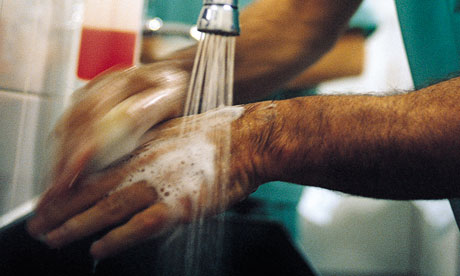Hospital hygiene drive 'saved 10,000 lives'
'CleanYourHands' campaign has led to significant fall in MRSA and other superbug infections, says BMJ report

MRSA rates in hospitals fell by more than half between July 2004 and June 2008, according to the BMJ study. Photograph: Getty Images
The government-funded campaign to improve hand hygiene at hospitals across England and Wales led to a significant fall in the rates of superbug infections, a report has revealed.
After the "CleanYourHands" campaign was rolled out in 2004, the amount of soap and alcoholic hand rub bought by NHS trusts almost tripled, according to a study published in the British Medical Journal (BMJ).
Over the same period, MRSA rates in hospitals were slashed by more than half, while there was a significant drop in the number of Clostridium difficile infections.
The campaign, backed by the Department of Health, was introduced across the 187 acute NHS trusts in England and Wales between December 2004 and June 2005.
It encouraged hospital visitors, patients and staff to wash their hands with soap or an alcohol gel when entering or leaving wards. People were also encouraged to clean their hands before touching patients or eating food and after going to the toilet.
As part of the drive, alcohol gels were put by bedsides, posters reminded staff to wash their hands and regular checks were made to ensure hands were kept clean.
The BMJ study, which analysed statistics between July 2004 and June 2008, found that the number of patients infected with MRSA fell from 1.88 cases per 10,000 bed days to 0.91 over the four-year period.
Rates of C difficile infection dropped from 16.75 to 9.49 cases, while the number of cases of MSSA – a bacterium found on the skin – did not fall.
The study also found that hospital trust procurement of soap and alcohol hand rub rose from a combined 21.8ml to 59.8ml per patient bed day over the period.
The increased use of soap in hospitals was linked to reduced rates of C difficile infection, while rising use of alcohol hand rub was associated with a reduction in MRSA cases.
The report concludes: "The CleanYourHands campaign was associated with sustained increases in hospital procurement of alcohol rub and soap, which the results suggest has an important role in reducing rates of some healthcare associated infections.
"National interventions for infection control undertaken in the context of a high profile political drive can reduce selected healthcare associated infections."
Sheldon Paul Stone, senior lecturer at UCL medical school, who led the study, estimated that around 10,000 lives were saved because of the campaign, which ended in 2010.
He told the Independent: "Without a doubt, lives were saved by the campaign. I would say 10,000 lives over the four-year period of the study was a reasonable estimate.
"If hand hygiene were a new drug, pharmaceutical companies would be out selling it for all they were worth."
Stone added: "It is obvious the campaign should be continued. Independent groups have suggested it should. It needs a new focus on staff who use gloves. They deal with the most infectious patients but they are much less likely to use soap."
A spokesman from the Department of Health was quoted as saying: "The CleanYourHands campaign was successful in its aim to highlight the importance of good hand hygiene practice across the NHS. We know this has been successful.
"The challenge now is to ensure the NHS embeds the good practice highlighted in the campaign to achieve our ambition to wipe out avoidable healthcare-associated infection."
Hand hygiene campaign 'cut superbug infections'the campaign to improve hand
hygiene in hospitals in England and Wales contributed to a significant fall in the rates of superbug infections, according to a report.
The study published on the BMJ website showed the amount of soap and hand gel being used tripled during the campaign.
At the same time, levels of MRSA and C. difficile infections in hospitals fell.
The government has since dropped the campaign, but said its ambition was to "wipe out" such infections.
Hospital superbugs were once a real fear for many patients. In response the Clean Your Hands campaign, funded by the Department of Health, was introduced in all hospitals by June 2005.
Alcohol gels were put by bedsides, posters reminded staff to wash their hands and there were regular checks to ensure hands were kept clean.
By 2008, the total amount of soap and alcohol gel being purchased by hospitals trebled, going from 22ml per patient per day to 60ml per patient per day.
Rates of MRSA more than halved in the same time period and C. diff infections fell by more than 40%.
'Success story'
One of the report's authors, Dr Sheldon Stone from the Royal Free University College London Medical School, estimated that around 10,000 lives were saved because of the campaign.
He told the BBC: "It's been a real British success story, we've gone from being the dirty man of Europe to being world leaders.
"What we need to do is keep up the momentum and stay at the forefront of world hand hygiene."
A spokesman from the Department of Health said: "The Clean Your Hands campaign was successful in its aim to highlight the importance of good hand hygiene practice across the NHS. We know this has been successful.
"The challenge now is to ensure the NHS embeds the good practice highlighted in the campaign to achieve our ambition to wipe out avoidable healthcare-associated infection.
"We know real progress has been made in this area as MRSA bloodstream infections have dropped by 41% and C. difficile by 30% across the NHS in England since 2009/10.







